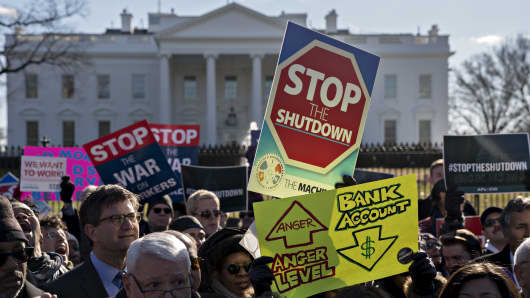It’s Day 21 of the partial government shutdown. That ties the record for a standoff set in the 1995-96 budget battle between President Bill Clinton and House Speaker Newt Gingrich.
We are now seeing a rash of analyst notes warning that this will soon start to affect different businesses.
American Airlines shares fell Thursday because of lower revenue guidance and weaker-than-expected domestic performance in December. And Cowen warned about the effect of the shutdown on airlines.
“[T]he government shutdown will impact the industry’s corporate travel business the longer it lasts. American in particular has exposure to the government with its hub at Washington, DC Reagan National Airport. We believe government contractors are not traveling during this shutdown, and the longer it goes on, the greater the impact.”
Of particular concern is what will happen to lower-income people and tax refunds. Macquarie noted the potential effect on retailers:
“Today is a primer in case tax refunds are delayed despite what the White House has to say about tax refund precedent when the government is shutdown. If the government remains shut down going into earnings — we may hear some conservative commentary about [quarter-to-date] comp trends from the retailers. Ultimately, the government will reopen and checks will be sent out but it may happen later in the first quarter of 2019.”
BMO Capital also weighed in on what the shutdown means for stores that cater to lower-income consumers, particularly the dollar stores:
“Prolonged government shutdowns jeopardize food stamps and other benefits that may harm low income consumers. Both dollar store companies see significant sales from lower income consumers and ~5% of sales directly from SNAP benefits for food,” BMO wrote. “This is in addition to any other forms of assistance that these consumers may receive (healthcare benefits, government paychecks, etc.) and the potential for delayed tax returns which may also be impacted by the shutdown. Given that the government is currently shutdown and there is the potential for future gridlock given the split in control of the government, we see a risk that both dollar stores could face a sales headwind if this continues.”
Defense contractors are also being affected. Moody’s warned on Thursday that “defense services contractors that derive a significant portion of their work from agencies that have not been funded, such as NASA and the State Department, are likely to face disruption. These contractors will accrue unbilled receivables if they keep working or will lose revenue if they halt projects.”
Others have longer-term concerns. Here is Macquarie on the shutdown and what it mean for infrastructure projects:
“The US government shutdown and debate over a border wall with Mexico has forced metal market participants to re-evaluate their expectations of whether a long- anticipated infrastructure spending bill will come to pass over the next two years.”
Even longer-term, Stifel writes that the shutdown may influence the willingness of cybersecurity and IT talent to work for the government:
“Concerns Increase that Shutdown Will Impact Federal Cybersecurity – Fifth Domain writes that the federal shutdown may have another unintended consequence: scaring away badly needed IT talent. As mentioned by Representative Robin Kelly (D-IL), relative to commercial businesses, the shutdown highlights the political risk of working for the government and not receiving a paycheck. According the Fifth Domain, the partial shutdown has resulted in 85% reduction in the National Institute of Standards and Technology’s workforce, a 60% reduction in the Director of National Intelligence’s analysis and operations staff, and 45% reduction in the Cybersecurity and Infrastructure Security Agency workforce. The issue also affects contractors, who, unlike their federal customers, will not receive back pay for not working during the shutdown. Stifel’s take: We concur that the shutdown will likely have a negative impact on recruiting and retaining qualified IT talent for the federal government, likely pushing such talent toward more commercial work.”
This is not just theoretical — some damage has already been done. J.P. Morgan has already lowered first-quarter GDP estimate to 2 percent from 2.25 percent. “The primary reason for the downward revision is the economic impact of the ongoing shutdown of the federal government.”






